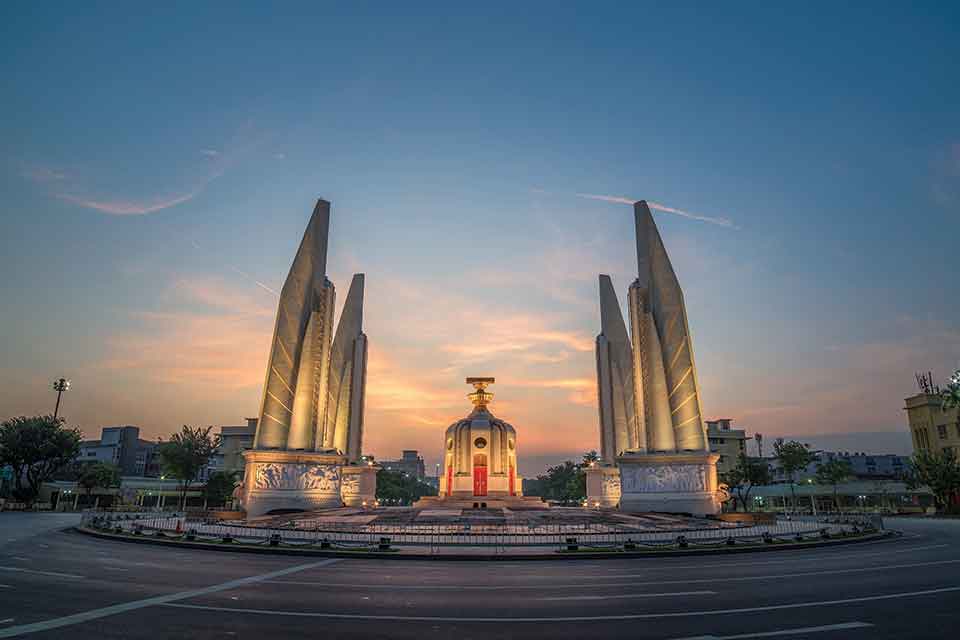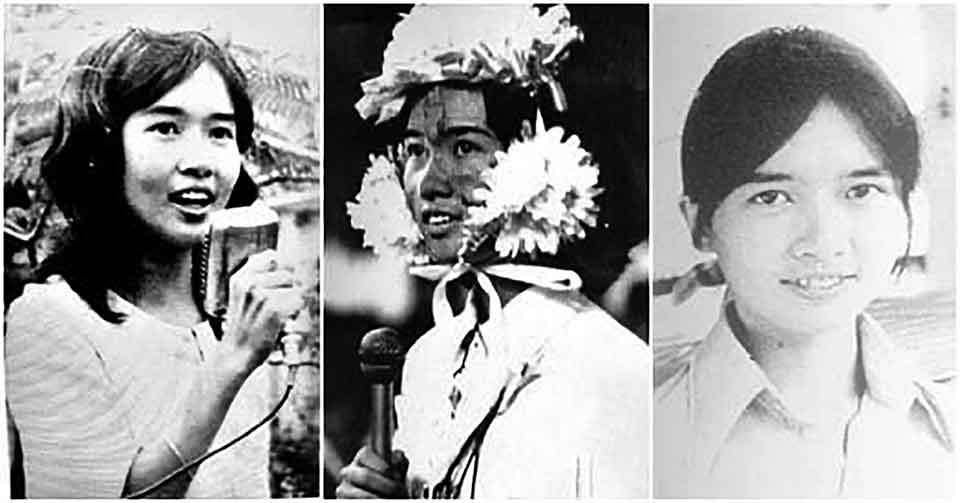A Flower’s Defiance: Three Decades of Chiranan Pitpreecha’s Poems for Thai Democracy

Chiranan Pitpreecha’s poetry gave voice to Thailand’s mass pro-democracy movement of the early 1970s. After a violent government crackdown in 1976, she fled to join the Communist Party of Thailand as a dissident. The poems in Bai mai thi hai pai (1989), Pitpreecha’s award-winning collection, called for the end of Thailand’s military dictatorship. Over thirty years later, their legacy still remains ambiguous.
Chiranan Pitpreecha’s poem “Sunset over Thunder Spring,” which memorializes the then-twenty-five-year-old’s defection from Thailand’s Communist Party, ends with a glimpse of a lone forest patrol station “still distant,” with Chiranan and two companions pondering “whether to laugh or weep” at their departure from the jungle, where they have spent the last five years as outlaws. Unable to arrive at an answer, Who knows anymore? is the question they leave themselves. A similar ambiguity persists around the entire period of Thai history represented in Chiranan’s poetry collection Bai mai thi hai pai (1989; The leaf that went missing)—what it meant, what its legacy is—more than three decades after the poems’ first publication.
Since the fall of the absolute monarchy in 1932, Thailand’s leadership has been dominated by dictators and military strongmen. By the end of the 1960s, resistance toward such government was beginning to mount, especially among Thailand’s university student population, which burgeoned from 18,000 to 100,000 between 1968 and 1972. Although many of those students were the first in their families to attend college, Chiranan (b. 1955) came from an educated household: her mother had been a primary school teacher who later opened a bookshop in their southern province of Trang. It was here that the young talent nurtured her fascination for the written word and discovered her skill at writing poems, which began when she was thirteen or fourteen years old. “As a child I loved reading Hans Christian Andersen and the Grimm brothers,” she would later recall. “When I think about it, their stories really embedded themselves inside my heart . . . like the one about the child selling matchsticks, and another one whose title I don’t remember about a swallow who nests on a military monument because she feels sorry for the stone soldier whose eyes had been gouged out. She freezes to death because she won’t migrate with her flock. I used to cry in secret over these tales. It’s strange . . . I had never experienced anything like the Little Match Girl did; I had never known such intense cold in my life, but I imagined it often. In the end I would come to know both want and cold—such that I thought I wouldn’t survive—but only when I was much older.”
Since the fall of the absolute monarchy in 1932, Thailand’s leadership has been dominated by dictators and military strongmen.

Chiranan arrived at Chulalongkorn University in 1972 to study medicine. Although she participated in more traditional university activities—she was once voted a school star, something like a prom queen—Chiranan was also quickly swept into the “ideological swirl that included democratic liberalism, Buddhist notions of justice, and nationalist opposition to exploitation by both the USA and Japan” then spreading throughout campuses in Bangkok, as described by Christopher Baker and Pasuk Phongpaichit in A History of Thailand (2013). Indeed, her boyfriend at the time, Seksan Prasertkul, a political science student from Thammasat University, was one of the most prominent of the student activists that dominated civic life of that era. These students were at the front lines of numerous social causes, including a boycott of Japanese imports, denunciation of the United States’ use of Thailand as a base for its military operations in Indochina, and, ultimately, their call for elections and a constitution from the dictator of the day, Thanom Kittikhachorn. In 1972 Thanom had staged a coup against his own government, dissolving parliament, and revoked the constitution; university students, under the direction of leaders like Seksan, took to the streets over the next year to express their dissent. Chiranan’s poems from this period, circulated in student pamphlets and other publications, were read as calls to action at these rallies. Like one of her most famous pieces, the songlike “The Flowers Will Bloom,” these poems position university students at the forefront of the movement for social change:
The young men and women dressed in white
For solutions will strive and belief ignite
They will learn and against illusion fight [. . .]
Right here and elsewhere too
hand out these blooms among the People.
The emphasis on both young men and women is important here, for as Chiranan and her peers imagined a more equitable society, they also reevaluated the status of women, and through Chiranan, Thai feminism finds its most famous credo:
A flower has sharp thorns—
does not bloom for anyone’s praise.
She spreads her petals to embrace
The abundance of the earth!
(from “A Flower’s Defiance”)
On October 13, 1973, half a million civilians led by student activists amassed in Bangkok to demand elections from the Thanom regime, with Seksan himself leading a delegation to the king to mediate in their favor. But as the demonstrators dispersed on the morning of October 14, soldiers fired into the crowds, killing (by some counts) 77 and injuring 857. With such carnage on his hands, Thanom was ultimately pressured out of office and into exile by the king and other military leaders. Chiranan and her fellow student activists had successfully toppled the military government.
Once there was a naïve little girl
(if you would even acknowledge her)
who let herself be led astray
by sugared words; who turned away
from the parched earth the laborers till
and felt nothing at the pain before her.
How she used to beam, how she busied herself
painting a self-portrait no one could appraise;
she was a star, a socialite, as she “should” have been,
parading down her university’s halls.
Then came moments her conscience warned her
to question what it all means in a world
where so many still suffer. [. . .]
Then, wakened to shame,
I started striving for change, and to myself
appointed one task: fix the system.
(from “From the Mountains, My Inmost Thoughts”)
Over the next three years, however, circumstances aligned to give the military and other conservative institutions the chance to regain power. After the withdrawal of American troops from Indochina in 1975, which saw the triumph of communism in Vietnam, Cambodia, and Laos, Chiranan’s “young men and women” were increasingly vilified by the greater populace for their leftist politics. Then, in October 1976, it was announced that ex-premier Thanom was returning to Bangkok; students gathered at Thammasat University to protest, and two were lynched as they put up demonstration posters. Military and police forces quickly mobilized against the students, and on October 6, 1976, there was a massacre on campus grounds: the military fired missiles into the crowd and brutally killed those who could not escape. The same evening, it staged another coup, returning the country to dictatorship and effectively crushing the student movement.
Tonight, I saw a shooting star burn out
and shook, afraid someday to be a star.
(from “Night Ponderings”)
Out of a “mixture of political conviction and self-preservation,” an estimated three thousand former student activists fled Bangkok to join the Communist Party of Thailand, including Seksan and Chiranan. As a teacher in the makeshift schools and education camps established by the CPT, Chiranan received the nickname Sahai (“comrade”) Baimai—“leaf” or “leaves”—while in the jungle. The postscripts to the poems written over this four-year period record Chiranan’s wanderings around Thailand’s rural periphery: ranging from the banks of the Mae Chan River in the northernmost mountains to the arid northeastern plateau. During this time, Chiranan would also become a mother, giving birth to a son at a medical outpost before spiriting him away to relatives in the city. Her poems at this time also include propagandistic depictions of life as an outlaw, celebrating their cause, as in “Resting the Troops”:
By day the blazing sun and rustling leaves
find us crossing hollows and fording streams
as we set out upon our winding course
deep into thickets dense that have no name
amid the growl of guns. The people groan;
the land where we were born burns bright with flame;
and war at every minute rages on.
Each print we leave within the mire and mud,
small traces of a life in which we’ve had to learn
what struggle is.
But not all was well within the camps: “The students who entered the jungle chafed under CPT discipline. Seksan Prasertkul complained that they ‘had to fight for democracy all over again in the jungle.’ [. . .] Emerging awareness of Cambodia’s bloody experience under the Khmer Rouge further undermined enthusiasm for rural-based revolution.” By 1980 a more centrist government was also pouring money into rural areas to alleviate poverty and discourage new recruits, while offering amnesty to those who defected as well. Recalling this period later in “Speck of Dust,” Chiranan assumes the voice of a “shard of rock” frustrated at its isolation (“Lonely and cold, the place where I live, / taking in the detritus of every day”) and bristling to return to a life of action:
I am a little shard of rock
breaking open in sadness. And better
that I be ground into a speck of dust
than suffocate here underwater!
Finally, on October 3, 1981, eight years after their initial bloody October, Chiranan, along with Seksan and a third companion, defected from the CPT, surrendering themselves to rangers posted at Thunder Spring: “The touch of rough hands before we part ways: / our friends have shared our hardship this far. / Now steeling ourselves for what lies ahead / out of the trees we emerge.”
* * *
The political legacy of Chiranan Pitpreecha and her generation of student activists remains inconclusive. In 2019, thirty years after The Leaf That Went Missing appeared in print, Thailand had just conducted its first “free” election since the current junta took power five years earlier—since it seized power in the fifth coup the country had seen in the same amount of time. The military’s role in the new government—it handpicked parliament’s lower house—was hotly contested. It was the anticlimax of a succession of protests and counterprotests, sometimes violent, that had rocked the country since 2006, toppling one government and ushering in another only to be toppled in its turn, a cycle that resembled a farcical take on the Buddhist wheel of birth and rebirth. That junta has since remained in power despite the latest rounds of mass demonstrations against it. The state of democracy in Thailand remains as uncertain as ever, and even civic markers of the country’s struggle for government by the people have gone inexplicably missing—such as the commemorative plaque left by the original framers of the 1932 revolution, which mysteriously disappeared from Bangkok’s Royal Plaza in April 2017.
The political legacy of Chiranan Pitpreecha and her generation of student activists remains inconclusive.
After defecting from the CPT, Chiranan left Thailand to study at Cornell University, where she earned both a bachelor’s in political science and a doctorate in history. Upon her return, she sifted through the poems she had written over the past two decades and published them as The Leaf That Went Missing, which remains to date one of only two collections. The book was a sensation even before it was released: “The publisher dared to appraise the manuscript at higher than the standard rate, making it a matter of talk throughout the industry,” one scholar recalled in 1993. And in 1989, the year of its release, the collection was awarded the country’s most prestigious literary prize, the Southeast Asian Writers (SEAWrite) award, which marked a turning point in how openly Thai society—and the Thai government—was ready to acknowledge the events of ’76. Since then, The Leaf has never gone out of print, selling an estimated two million copies by 2011.
However, even the relationship between The Leaf’s literary merit and the events of the twin Octobers has been debated. In their awards statement, the SEAWrite judging committee seems to distance the poems from their politics: “The Committee has not forgotten to ask itself if we are praising the work because of those events or not, and for readers who do not know this background, if in fifty years they will understand the weight of these poems,” they admit in the award statement. Their conclusion: “The significance of this work lies in the content and artistic composition of each poem, and is unrelated to the time period or the personage behind them.” To this, fellow SEAWrite author Naowarat Phongphaiboon, who also wrote an introduction for The Leaf, had this to say: “The crown of poetry was not placed on Chiranan’s head by anyone’s hands. It was the age alone created her along with the crown of poetry. . . . The day and age did chiaranai [“to cut a gemstone into shape,” a pun on the poet’s name] Chiranan in this way.”
Even the relationship between The Leaf’s literary merit and the events of the twin Octobers has been debated.
Unlike her former husband, Seksan, Chiranan has not gone into an academic career but has worked as a writer and translator of foreign films and for the most part abstained from public political commentary. In my 2011 edition of The Leaf, Chiranan’s biography remarks that she has also taken up photography, noting with some irony that she was once a leader in the boycott against Japanese goods. By all appearances, the former agitator for social justice and communist outlaw has settled into a relatively middle-class and mostly apolitical lifestyle. This has not gone unnoticed; while preparing to write this reflection, I encountered a poem addressed to Chiranan on a private social media account. The poem was dated from the populist “Red Shirt” demonstrations of 2009, when supporters of ousted premier Thaksin Shinawatra seized hold of Bangkok’s central business district. “Where are you now, Friend of the Leaves?” it demanded to know. “Why don’t you join our cause? Or were all those pretty words mere posturing? Are you happy now with wealth and fame?” This is necessarily a crude paraphrase, for when I tried to find the post again, it, too, had gone missing.
So what does it mean to read The Leaf That Went Missing today, more than thirty years since the collection was first published, and almost fifty since the pro-democracy movements to which it gave voice took place—and, by most estimates, failed? Certainly, a sense of defeat hangs heavy over the collection’s final poem: “Two currents, twin rivers, coursing through time / to circle and swim in, losing my way: / immersed in yesterday’s stream, I shudder, / and my spirit is broken in today’s.” The speaker here, passing through a campus green, an allusion to the grounds where the 1976 massacre occurred, finds no one, only a pipal or Bodhi tree—normally a symbol of protection and wisdom—“withered and dry.” Yet, in a different poem, another tree image grows: “Let me only devote my defeat / to the earth beneath me / so that plant-life might flourish [. . .] / sprout shoots / and overlapping leaves, / and with [their stalks] / stand against time.” Here, in “Last Will,” written within days after Chiranan’s desertion from the CPT, personal failure sows the seeds for collective growth.
And perhaps in this lies The Leaf That Went Missing’s unambiguous legacy and recommends its translation to an audience beyond Thailand. In an age that has seen the return of strongmen and authoritarian rule around the world, Chiranan Pitpreecha’s The Leaf That Went Missing may inspire a new generation of fighters for social justice and government by the people, and it might be their revolution that succeeds.
Washington University in St. Louis
Author’s note: My translations of “Sunset Over Thunder Spring,” “Night Ponderings,” and “Speck of Dust“ appear in Two Lines. “A Flower’s Defiance,” “Resting the Troops,” and “From the Mountains, My Inmost Thoughts” are previously unpublished. Translations from Bai mai thi hai pai, 34th edition, © 2017. English translation copyright © 2020–2022 by Noh Anothai.










